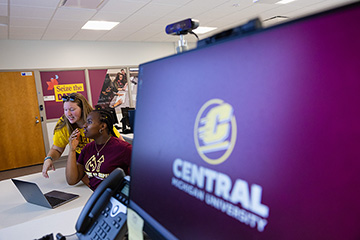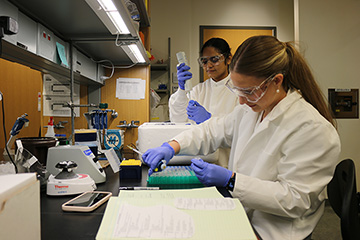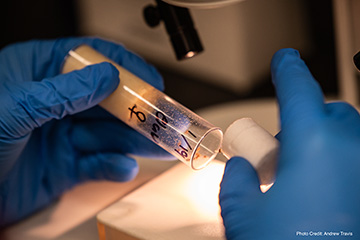CMU physics team aids search for habitable planets
Researchers use accelerator to improve accuracy of measuring planetary conditions
Central Michigan University physics faculty member George Perdikakis and graduate students are leading an experiment that connects nuclear physics with a search for possible habitable planets outside our solar system.
Their work with a team at Ohio University promises to move the needle closer to determining which Earth-like exoplanets could support life as we know it.
The experiment used the Edwards Accelerator Laboratory at Ohio University and scientific models to determine the rate of destruction of the radioactive isotope potassium-40, or 40K, inside dying stars. When these stars die, they release potassium, which then gets stored in large amounts inside planets.
The radioactive decay of 40K creates heat, which plays a significant role in maintaining the temperature of a planet's mantle — the layer between the planet's superheated core and its outer layer. It affects the geological activities of a planet and the development of a habitable environment on its surface.
CMU is using nuclear physics experiments to help more accurately calculate the amount of 40K in exoplanets.
“We are now branching out into an exciting new field that connects nuclear physics, astrophysics and geology.” — George Perdikakis, CMU physics faculty member
The team's work included two weeklong 24/7 experiments at the accelerator. In Ohio, they used proton beams to study one of the nuclear reactions that destroy 40K inside a dying star before it is released in space.
The findings are expected to help improve the accuracy of the heating models currently used to identify exoplanets that could support life.
"This is an excellent example of how studies in nuclear physics can spin off advancements in other fields," Perdikakis said. "We are now branching out into an exciting new field that connects nuclear physics, astrophysics and geology."
More than 4,000 exoplanets have been discovered, and roughly 5,000 more are awaiting confirmation, Perdikakis said.
"Exoplanet discoveries have changed our view of the universe forever. Being able to understand which of these new worlds can foster life and, in particular, human-like life is one of the big quests of exoplanetary science."
A principal member of CMU's research team was Panagiotis Gastis, of Greece. He graduated this spring and began a postdoctoral position at the prestigious Los Alamos National Laboratory in New Mexico.
Work on the exoplanet project is continuing this summer by Perdikakis' research group of one graduate and three undergraduate students.




